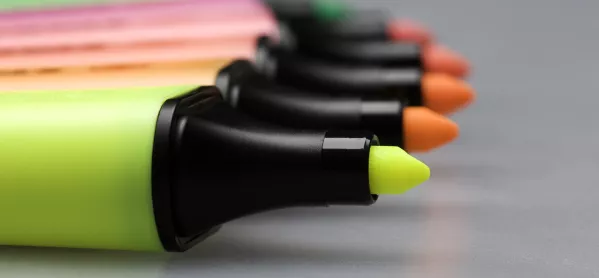During a recent conference talk I said something deeply contentious. Heckling commenced. Chairs were thrown. Security personnel were called. Not really, but I’d clearly uttered something deeply seditious. What triggered outbursts from the mildest mannered of teachers? I merely suggested that the following beloved items of stationery should be banned:
Highlighters
Highlighting while reading appears logical. But Dunlosky et al. (2013) argue that students highlight too much text, making it less memorable.
So why do pupils stick so slavishly to their Stabilos, spreading colour like Fauvist painters?
Alex Quigley, author of The Confident Teacher, thinks highlighting requires little mental effort because it lacks Bjork’s (1994) “desirable difficulty”, compared to flash cards.
Even when teachers train pupils with explicit instructions, research shows no difference in the performance of students using highlighters and those just reading the text.
Glue sticks
Glue sticks end up minus their top more than a Love Island contestant, but are good at sticking paper into books. Worksheets, however, usually mean a teacher trying to show progress is being made. Blogger Chris Curtis argues Pritt-sticked worksheets are “poor proxies for learning”. For example, pupils might complete a worksheet in a lesson, which might only equate to five lines in an exercise book. Worksheets also limit pupil responses by being badly-worded or too small to write in (Lesley and Labbo, 2003).
So, remove glue sticks and stop worksheets from being used in books as a progress-proving resource. Think of them as the gateway drug of the stationery world.
Red pens
Once upon a time teachers marked in red pen, correcting errors and clichéd fronted adverbials. But snowflakey kids couldn’t deal with red ink, so teachers switched to more soothing colours. Was this bonkers political correctness? Should teachers reclaim their red biros?
Dukes and Albanesi (2012) say scarlet-wielding teachers are viewed as “less nice” and as having “less rapport with students”. Rutchick et al. (2010) found teachers marking essays in red picked out more errors and assigned lower grades.
Instead, use aqua blue-green, with its peaceful connotations of the sea, bringing new life to the teacher’s lament of “drowning in marking”.
Coloured paper and overlays
Teachers regularly produce resources using coloured paper for dyslexic pupils. But what if this specialised stationery doesn’t actually work?
Creavin et al. (2015) found little difference in the amount of visual problems in children with and without dyslexia. According to the Rose Review (2009), dyslexia is largely a phonological (patterns of speech sound) condition. This was reflected in Griffiths et al.’s (2016) summary, finding coloured aids have effect sizes similar to a placebo.
While coloured paper or overlays might make a difference in some cases - psychologically or for visual stress conditions - providing this stationery support just isn’t enough for the vast majority.
Classroom posters
Posters listing monarchs, averages or conjunctions must surely help pupils absorb extra knowledge? According to Sweller’s Cognitive Load Theory (1988), they might overwhelm pupils trying to cope with what you’re actually teaching. Discussing static electricity near a display on atomic structure may well overburden their working memory.
So no more posters? If you insist, you’ll need to keep them away from the board, with more graphics than text. Otherwise, your astronomy display might have them literally staring into space.
Our stationery use is dictated by habit and intuition. Even if our much-loved stationery isn’t hindering learning, it may well be distracting from techniques that could have much greater benefits.
Mark Roberts is an assistant headteacher in the South West of England.
This article is adapted from a version in the 7 September issue of Tes. To read it in full, pick up a copy from your local newsagent or subscribe to read online.





